Cold War

Title: We Were Berliners
Author: Helmut & Charlotte Jacobitz
Publisher: History Press
Price: £18.99
Bookshop: Amazon
Spartacus Website: The Berlin Wall
Category: Cold War
Written to commemorate the one hundredth anniversary of the first predominantly anti-capitalist revolution in the world, Mexico’s Revolution Then and Now is the perfect introductory text and one that will also sharpen the understanding of seasoned observers. Cockcroft provides readers with the historical context within which the revolution occurred; explains how the revolutionary process has played out over the past ten decades; tells us how the ideals of the revolution live on in the minds of Mexico’s peasants and workers; and critically examines the contours of modern Mexican society, including its ethnic and gender dimensions. Well-deserved attention is paid to the tensions between the rulers and the ruled inside the country and the connected tensions between the Mexican nation and the neighboring giant to the north.
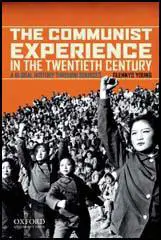
Title: The Communist Experience
Author: Glennys Young (editor)
Publisher: Oxford University Press
Price: £18.99
Bookshop: Amazon
Spartacus Website: The Cold War
Category: Cold War
Using a source-based approach, The Communist Experience in the Twentieth Century is the first text designed to help students, general readers, and scholars understand how people constructed Communist ways of life around the world. Taking a global approach, it extends beyond Russia and Eastern Europe to examine the lives of people in China, Korea, Vietnam, Cambodia, Kyrgyzstan, Algeria, Peru, Cuba, and elsewhere. The book provides an inside look at the Communist experience, where people were--sometimes simultaneously so--enthusiasts, reshapers, resisters, and victims of an ideological project that was (and, for some, still is) both humanity's darkest nightmare and brightest hope. Since the collapse of Communist regimes beginning in 1989, vital questions--about how people subjectively experienced Communism, helped to shape it, and constructed an idea of "self" in such restrictive environments--have not lost their political significance. In fact, just the opposite holds true. The opening of many formerly closed Communist archives has given scholars the opportunity to research the political significance that the construction of the self had across Communist regimes, polities, and movements. Incorporating the latest scholarship, The Communist Experience in the Twentieth Century includes previously unavailable documents, such as diaries and letters, which are now accessible as a result of the archival revolution. A photo essay, "Everyday Life and Everyday Things under Socialism, 1945-1989," uses visual evidence to explore everyday life across the Communist civilizations. A locator map at the beginning of each chapter identifies the places associated with each of the sources, and a chronology provides a comparative timeline for Communist and world history.
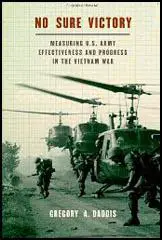
Title: No Sure Victory
Author: Gregory A. Daddis
Publisher: Oxford University Press
Price: £11.95
Bookshop: Amazon
Spartacus Website: The Vietnam War
Category: Vietnam War
It is commonly thought that the U.S. Army in Vietnam, thrust into a war in which territory occupied was meaningless, depended on body counts as its sole measure of military progress. In No Sure Victory, Army officer and historian Gregory A. Daddis uncovers the truth behind this gross simplification of the historical record. Daddis shows that, confronted by an unfamiliar enemy and an even more unfamiliar form of warfare, the U.S. Army adopted a massive, and eventually unmanageable, system of measurements and formulas to track the progress of military operations that ranged from pacification efforts to search-and-destroy missions. Concentrating more on data collection and less on data analysis, these indiscriminate attempts to gauge success may actually have hindered the army's ability to evaluate the true outcome of the fight at hand--a roadblock that Daddis believes significantly contributed to the multitude of failures that American forces in Vietnam faced. Filled with incisive analysis and rich historical detail, No Sure Victory is a valuable case study in unconventional warfare, a cautionary tale that offers important perspectives on how to measure performance in current and future armed conflict.
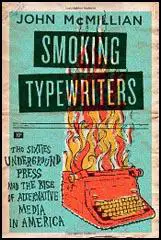
Title: Smoking Typewriters
Author: John McMillian
Publisher: Oxford University Press
Price: £17.99
Bookshop: Amazon
Spartacus Website: Journalism
Category: Cold War
How did the New Left uprising of the 1960s happen? What caused millions of young people--many of them affluent and college educated--to suddenly decide that American society needed to be completely overhauled? In Smoking Typewriters, historian John McMillian shows that one answer to these questions can be found in the emergence of a dynamic underground press in the 1960s. Following the lead of papers like the Los Angeles Free Press, the East Village Other, and the Berkeley Barb, young people across the country launched hundreds of mimeographed pamphlets and flyers, small press magazines, and underground newspapers. New and cheap printing technologies had democratized the publishing process, and by the decade's end the combined circulation of underground papers stretched into the millions. Though not technically illegal, these papers were often genuinely subversive, and many who produced and sold them--on street-corners, at poetry readings, gallery openings, and coffeehouses--became targets of harassment from local and federal authorities. With writers who actively participated in the events they described, underground newspapers captured the zeitgeist of the '60s, speaking directly to their readers, and reflecting and magnifying the spirit of cultural and political protest. McMillian gives special attention to the ways underground newspapers fostered a sense of community and played a vital role in shaping the New Left's "movement culture." By putting the underground press at the forefront, McMillian underscores the degree to which the political energy of the 1960s emerged from the grassroots, rather than the national office of Students for a Democratic Society (SDS), which historians of the era typically highlight. Deeply researched and eloquently written, Smoking Typewriters captures all the youthful idealism and vibrant tumult of the 1960s as it delivers a brilliant reappraisal of the origins and development of the New Left rebellion.
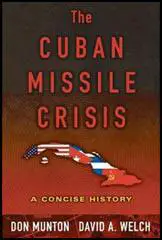
Title: The Cuban Missile Crisis
Author: Don Munton & David A. Welch
Publisher: Oxford University Press
Price: £12.99
Bookshop: Amazon
Spartacus Website: Cuban Missile Crisis
Category: Cold War
This book fills the gap between the longer, more detailed texts on the Cuban Missile Crisis, and the popular histories, most notably Robert F. Kennedy's Thirteen Days (and the 2000 TV movie of the same title). Munton and Welch have written a short, readable text that stresses the big picture, answers the important questions and corrects the historical inaccuracies of Thirteen Days. The authors make use of newly available sources from US and Russian archives to present Soviet and Cuban perspectives in the crisis, which have in the past been unavailable or downplayed.

Title: The Spiritual Industrial Complex
Author: Jonathan P. Herzog
Publisher: Oxford University Press
Price: £22.50
Bookshop: Amazon
Spartacus Website: The Cold War
Category: Cold War
In his farewell address, Dwight D. Eisenhower warned the nation of the perils of the military-industrial complex, but Eisenhower had spent his presidency contributing to another, lesser known, Cold War collaboration: the spiritual-industrial complex. This fascinating volume argues that American leaders in the early Cold War considered the conflict to be profoundly religious, that they saw Communism not as godless but as a religion fighting faith with faith. As a result, they deliberately used religious beliefs and institutions as part of the plan to defeat the Soviet enemy. Jonathan Herzog offers an illuminating account of the spiritual-industrial complex, chronicling the rhetoric, programs, and policies that became its hallmarks. Herzog shows how these efforts played out in areas of American life both predictable and unexpected--from pulpits and presidential appeals to national faith drives, military training barracks, public school classrooms, and Hollywood epics. Finally, he reveals that if the spiritual-industrial complex faded in the 1960s, its echoes could still be heard in Ronald Reagan's 1980s.
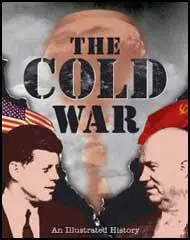
Title: The Cold War: An Illustrated History
Author: Andrew Heritage
Publisher: Haynes Publishing
Price: £20.00
Bookshop: Amazon
Spartacus Website: The Cold War
Category: Cold War
A comprehensive illustrated survey of the events which combined to form the 'Cold War' - an episode which still dominates the world in which we live today. For over four decades the world lived in the shadow of instant nuclear annihilation. The world map was divided into East and West, and war-scarred Europe was partitioned by the Iron Curtain. Each camp was presided over by the 'Superpowers' that emerged from the Second World War - the Soviet Union and the United States - superpowers divided by ideology but united by an ambition for world domination. Structured around a detailed timeline of critical events and brought to life by hundreds of unique contemporary photographs and images drawn from the world-famous Mirrorpix archive, this book examines the origins, development and eventual demise of the Cold War, and sets its darkest moment - the 40-year nuclear stalemate between East and West - in a broader historical and cultural landscape. As a record of the elaborate game of move and counter-move that was played out on a global chessboard, this book provides a rich and fascinating reference resource. As an introduction to understanding the complex shape of the world we live in today it is invaluable.
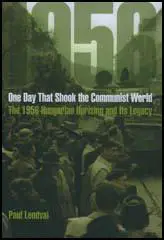
Title: 1956: One Day That Shook the Communist World
Author: Paul Lendvai
Publisher: Princeton University Press
Price: £16.95
Bookshop: Amazon
Spartacus Website: Hungarian Uprising
Category: Cold War
On October 23, 1956, a popular uprising against Soviet rule swept through Hungary like a force of nature, only to be mercilessly crushed by Soviet tanks twelve days later. Only now, fifty years after those harrowing events, can the full story be told. This book is a powerful eyewitness account and a gripping history of the uprising in Hungary that heralded the future liberation of Eastern Europe. Paul Lendvai was a young journalist covering politics in Hungary when the uprising broke out. He knew the government officials and revolutionaries involved. He was on the front lines of the student protests and the bloody street fights and he saw the revolutionary government smashed by the Red Army.In this riveting, deeply personal, and often irreverent book, Lendvai weaves his own experiences with in-depth reportage to unravel the complex chain of events leading up to and including the uprising, its brutal suppression, and its far-reaching political repercussions in Hungary and neighboring Eastern Bloc countries. He draws upon exclusive interviews with Russian and former KGB officials, survivors of the Soviet backlash, and relatives of those executed. He reveals new evidence from closed tribunals and documents kept secret in Soviet and Hungarian archives. Lendvai's breathtaking narrative shows how the uprising, while tragic, delivered a stunning blow to Communism that helped to ultimately bring about its demise. "One Day That Shook the Communist World" is the best account of these unprecedented events.
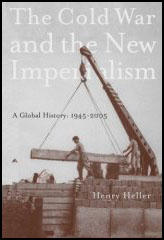
Title: The Cold War and the New Imperialism
Author: Henry Heller
Publisher: Monthly Review Press
Price: £17.95
Bookshop: Amazon
Spartacus Website: Cold War Index
Category: Cold War
"The Cold War and the New Imperialism" is an account of global history since 1945, which brings massive changes in global politics, economics, and society together in a single narrative, illuminating and clarifying the dilemmas of the present. Written for the general reader, it draws together scholarly research from a wide range of sources without losing sight of the larger pattern of events. In the sixty-year period since the end of World War II, the world has indeed been remade. The war itself mobilized the political and social aspirations of hundreds of millions of people. The contest between the United States and the Soviet Union for global dominance drew every country into its field of force. Struggles for national liberation in the Third World brought an end to colonial empires. Revolutions in China, Cuba, Vietnam and elsewhere shook the global order, as did failed uprisings in Paris and Prague. Since the end of the Cold War the forces of the capitalist market have overwhelmed social institutions that have given meaning to human existence for centuries. But the end of the Cold War has created as many problems for the world's remaining superpower, the United States, as it has solved. With its political, economic, and financial hegemony eroding, the United States has responded with military adventures abroad and increasing inequality and authoritarianism at home. "The Cold War and the New Imperialism" draws all these threads together and shows vividly that the end of history is not in sight.
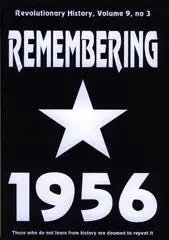
Title: Remembering 1956
Author: Al Richardson
Publisher: Porcupine Press
Price: £9.50
Bookshop: Amazon
Spartacus Website: Hungarian Uprising
Category: Cold War
Nikita Khrushchev's "Secret Speech" at the Twentieth Congress of the Communist Party of the Soviet Union in February 1956 sent shock-waves throughout the Soviet bloc and the official Communist movement. In their offices in London, Paris and Rome, Communist party leaders struggled to rescue what they could of their tattered public image, whilst their counterparts in Poland and Hungary were faced with mass working-class unrest in the streets of Poznan and Budapest. This book investigates reactions to the events of 1956.
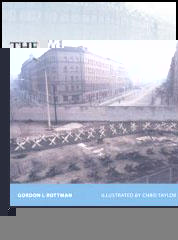
Title: The Berlin Wall 1961-89
Author: Gordon Rottman
Publisher: Osprey
Price: £11.99
Bookshop: Amazon
Spartacus Website: Berlin Wall
Category: Cold War
The border between East and West Germany was closed on 26 May 1953. On 13 August 1961 crude fences and walls were erected around West Berlin: the Berlin Wall had been created. The Wall encircled West Berlin for a distance of 155km, and its barriers and surveillance systems evolved over the years into an advanced obstacle network. The Intra-German Border ran from the Baltic Sea to the Czechoslovak border for 1,381km, and was where NATO forces faced the Warsaw Pact for the 45 years of the Cold War. This book examines the international situation that led to the establishment of the Berlin Wall and the IGB, and discusses how these barrier systems were operated, and finally fell.

Title: The Foundations of Ostpolitik
Author: Julia Von Dannenberg
Publisher: Oxford University Press
Price: £55.00
Bookshop: Amazon
Spartacus Website: Willy Brandt
Category: Cold War
Based on recently released archival sources, this book is the first systematic analysis of the German-Soviet negotiations leading to the conclusion of the Moscow Treaty of August 1970. This treaty was the linchpin of the 'New Ostpolitik' launched by Chancellor Willy Brandt's government as a policy of reconciliation and an attempt to normalize relations with the countries of the Eastern bloc. Focusing on the decision-making processes, both within the German domestic political system as well as within the international context, this study offers a new interpretation of the shift from confrontational to detente politics at this time, arguing that the Moscow Treaty was the product of various interrelated domestic and external factors. As Dannenberg shows, the change of government to a Social-Liberal coalition was the first important precondition for Ostpolitik, while the speedy conclusion of the Moscow Treaty owed much to the high degree of secrecy and centralization that characterized Brandt's policy-making and that of his small coterie of advisors. However, Brandt's predominance in the decision-making process does not mean that he alone determined the direction of policy. His room for manoeuvre was, amongst other things, constrained by his coalition's narrow parliamentary majority as well as the Western Allies' special rights. On the other hand, German-Soviet trade expansion, public opinion, and the emerging international interest in detente in the mid-1960s were crucial factors favouring Ostpolitik. It was in this configuration of circumstances that Brandt placed himself at the forefront of the movement towards detente between East and West by introducing his bold diplomatic design - one that had the reunification of Germany as its ultimate goal.
